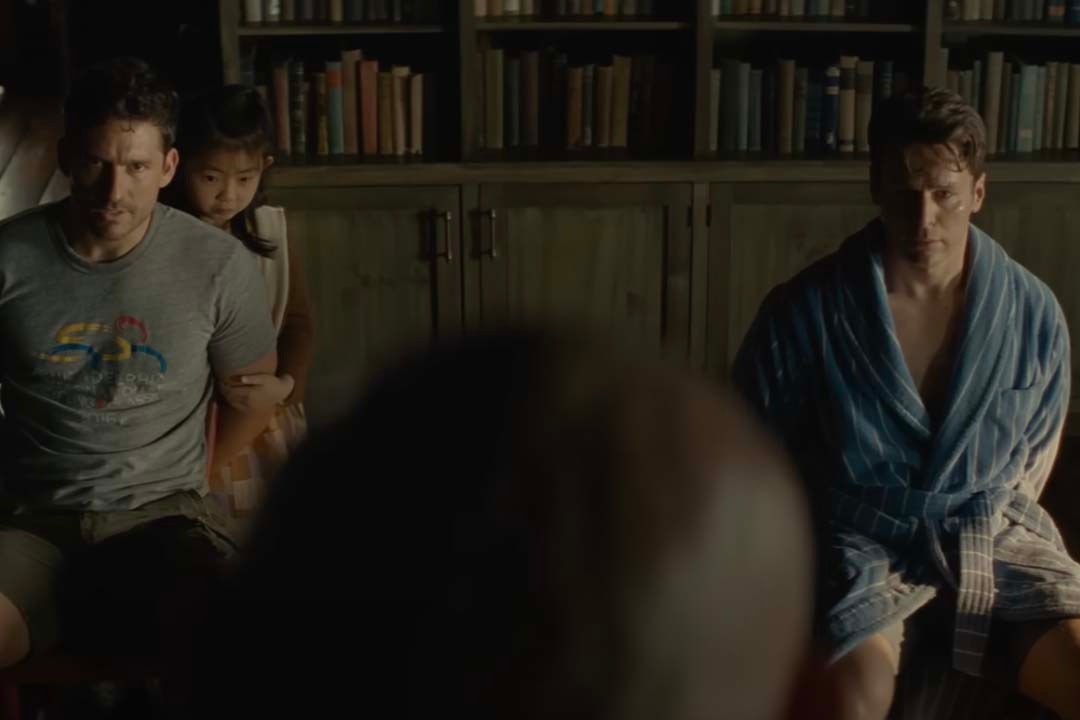Create a free profile to get unlimited access to exclusive videos, sweepstakes, and more!
'Knock at the Cabin' flips the apocalypse and home invasion genres, Shyamalan says
Knock at the Cabin is “playing into current society and collective fears more than his other films have.”

Knock at the Cabin is not M. Night Shyamalan’s first time depicting the end of the world. Both Signs and The Happening were about regular people dealing with the potential end of civilization, and After Earth is post-apocalyptic. But the new film, now in theaters, certainly feels more relevant than his previous takes on the end times. That, he tells SYFY WIRE, is by design.
“For whatever reason, the movies always reflect where I am.” Shyamalan explained ahead of the film’s Feb. 3 premiere.”This time, it’s starting with our current world events and taking a fictional story from that point on. Hey, the things that we’ve been experiencing? How you’re thinking this is the end of the world? You know how that’s bothering you a little bit? Well, it is the end of the world, and there’s only one way to stop it.”
The film, based on Paul G. Tremblay’s novel The Cabin at the End of the World, is indeed about the end of the world — that is, if you believe the four armed intruders (played by Dave Bautista, Nikki Amuka-Bird, Abby Quinn, and Rupert Grint) who take married couple Eric and Andrew (Jonathan Groff and Ben Aldridge) and their daughter Wen (Kristen Cui) hostage at a vacation cabin. Unless they willingly choose to sacrifice one of their family, the invaders claim, the world will end. While they decide whether or not to accept, various disasters, like tsunamis and airplanes falling from the sky, will wreak devastation in the meantime.
“I think it felt very applicable. We’ve just survived a pandemic and the climate crisis is right there, every day, for us to be challenged by,” Aldridge told SYFY WIRE, adding that the central tension of the filming — whether or not what the doomsayers are claiming about the end of the world is true — is relevant, too. “Truth is a very interesting concept in our times right now, as is belief. If you believe something does it make it true? I was thinking about those things. I watched a lot of documentaries about cults and Qanon.”
Aldridge added that, with Knock at the Cabin, Shyamalan is “playing into current society and collective fears more than his other films have.”
RELATED: M. Night Shyamalan’s Knock at the Cabin cameo was his ‘highest degree of difficulty'
Knock at the Cabin is indeed an apocalyptic movie, but, as is frequently the case with Shyamalan, there’s a twist.
“It’s a really interesting story because everything is flipping on itself. The genres flip on themselves,” Shymalan explained. To Eric, Andrew, and Wen, the home invaders are the villains, but if what they say about the end times is true (admittedly a big if), then the four attackers are actually trying to save the world.
“When you think about the home invasion genre and the apocalypse genre, the antagonists and protagonists of those two stories are the opposite of each other,” Shyamalan says. “ So as the movie switches from one genre to this other genre, so do your feelings about the characters.”
Knock at the Cabin hits theaters on Feb. 3.


























